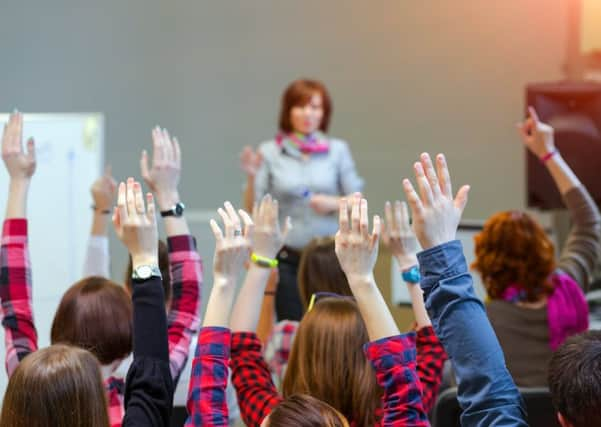Hansard Society: Mock elections give future voters a taste for the real thing


In the Hansard Society’s most recent annual Audit of Political Engagement, 61 per cent of people said they would be certain to vote in a general election, but only 47 per cent among 18 to 24-year-olds.
Younger people were also less likely to report having engaged in other forms of political activity, such as signing a petition, taking part in a campaign or contacting an elected politician.
Advertisement
Hide AdAdvertisement
Hide AdAnd younger people were also less likely than all but their oldest counterparts to say they knew a lot about politics, or were “very” interested in it.
But research has shown that one way young people become more likely to engage in political activity, including voting, is by participating in citizenship-related activities at school, such as school councils, debating teams and mock elections.
For the 2019 general election, the Hansard Society is again running its Mock Elections project, offering a free download of all the resources teachers and students might need to organise and take part in a school poll.
The Hansard Society has been running Mock Elections at each UK general election for over 50 years, making this one of the largest and longest running civic education projects in the world.
By participating, students gain valuable (and fun) hands-on experience of the workings of an election, from running a campaign, to organising voter registration and polling on the day, to perhaps reporting on it for the school newspaper or website.
This year, we are encouraging participating students and schools to share their stories, images and video on social media using the hashtag #MockElections2019.
And we will be generating and publishing a national Mock Elections result on the evening of 12 December, before the country finds out the outcome of the “real” general election.
We know that several of this year’s general election candidates, as well as former MPs and other prominent political figures (such as newly retired Commons speaker John Bercow), participated in mock elections when they were at school.
Advertisement
Hide AdAdvertisement
Hide AdBut even for those not aspiring to politics-related careers, various citizenship studies over the years have shown that students who participate in activities such as mock elections at school are more likely to have positive attitudes towards political participation as adults. This applies even when controlling for other relevant factors (such as higher levels of formal education).
Voting may be affected especially positively, because voting is in part a habit, so the earlier young people can get into it, the more likely they are to continue.
And participating in mock elections at school helps instil at a formative age other pro-voting traits, from a basic understanding of how to go about it and how the election process works, to the sense that political participation is “normal” and worthwhile.
We have conducted focus groups with disengaged members of the public who, sadly, had not been equipped with such a basic understanding, and who would find it hard to exercise their right to vote in a way that could be described or experienced as meaningful.
And the political environment in 2019 suggests that voting in a well-informed way, and in a healthy democracy, is, if anything, becoming harder. The 2019 general election takes place amid widespread concerns about the state of civic knowledge and skills in the UK, from the wider electorate to the Westminster elite.
Taking part in a mock election this year could thus foster skills that seem in especially short supply but which are increasingly clearly needed, such as assembling evidence, critically evaluating claims and proposals, and debating others in an informed and respectful way.
Against this background, holding a mock election is an opportunity not to be missed to cultivate among school students the kind of democratic political participation we want to see in future.
Dr Ruth Fox is Director and Dr Brigid Fowler Senior Researcher of the Hansard Society